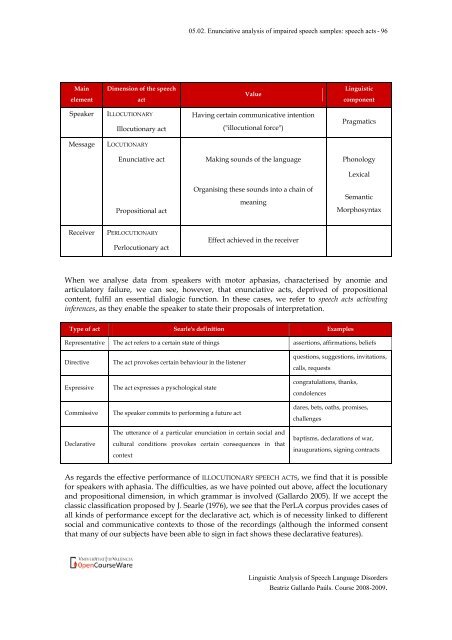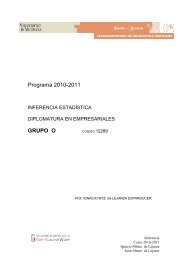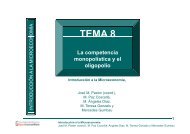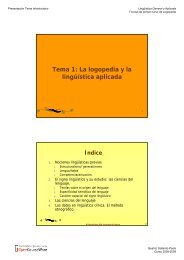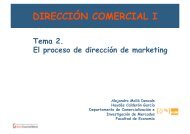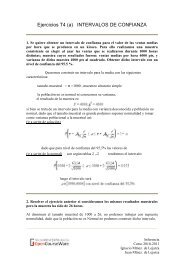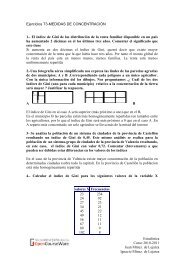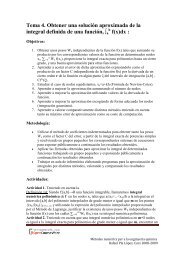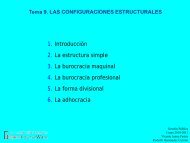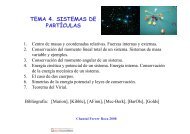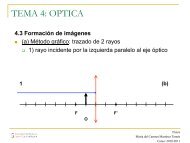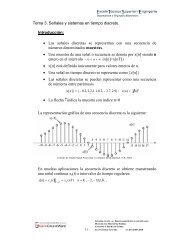05.02. Enunciative analysis <strong>of</strong> impaired speech samples: speech <strong>act</strong>s - 96MainelementDimension <strong>of</strong> <strong>the</strong> speech<strong>act</strong>ValueLinguisticcomponentSpeakerILLOCUTIONARYIllocutionary <strong>act</strong>Having certain communicative intention("illocutional force")PragmaticsMessageLOCUTIONARYEnunciative <strong>act</strong> Making sounds <strong>of</strong> <strong>the</strong> <strong>la</strong>nguage PhonologyLexicalPropositional <strong>act</strong>Organising <strong>the</strong>se sounds into a chain <strong>of</strong>meaningSemanticMorphosyntaxReceiverPERLOCUTIONARYPerlocutionary <strong>act</strong>Effect achieved in <strong>the</strong> receiverWhen we analyse data from speakers with motor aphasias, char<strong>act</strong>erised by anomie <strong>and</strong>articu<strong>la</strong>tory failure, we can see, however, that enunciative <strong>act</strong>s, <strong>de</strong>prived <strong>of</strong> propositionalcontent, fulfil an essential dialogic function. In <strong>the</strong>se cases, we refer to speech <strong>act</strong>s <strong>act</strong>ivatinginferences, as <strong>the</strong>y enable <strong>the</strong> speaker to state <strong>the</strong>ir proposals <strong>of</strong> interpretation.Type <strong>of</strong> <strong>act</strong> Searle's <strong>de</strong>finition ExamplesRepresentative The <strong>act</strong> refers to a certain state <strong>of</strong> things assertions, affirmations, beliefsDirectiveExpressiveCommissiveDec<strong>la</strong>rativeThe <strong>act</strong> provokes certain behaviour in <strong>the</strong> listenerThe <strong>act</strong> expresses a pyschological stateThe speaker commits to performing a future <strong>act</strong>The <strong>utterance</strong> <strong>of</strong> a particu<strong>la</strong>r enunciation in certain social <strong>and</strong>cultural conditions provokes certain consequences in thatcontextquestions, suggestions, invitations,calls, requestscongratu<strong>la</strong>tions, thanks,condolencesdares, bets, oaths, promises,challengesbaptisms, <strong>de</strong>c<strong>la</strong>rations <strong>of</strong> war,inaugurations, signing contr<strong>act</strong>sAs regards <strong>the</strong> effective performance <strong>of</strong> ILLOCUTIONARY SPEECH ACTS, we find that it is possiblefor speakers with aphasia. The difficulties, as we have pointed out above, affect <strong>the</strong> locutionary<strong>and</strong> propositional dimension, in which grammar is involved (Gal<strong>la</strong>rdo 2005). If we accept <strong>the</strong>c<strong>la</strong>ssic c<strong>la</strong>ssification proposed by J. Searle (1976), we see that <strong>the</strong> PerLA corpus provi<strong>de</strong>s cases <strong>of</strong>all kinds <strong>of</strong> performance except for <strong>the</strong> <strong>de</strong>c<strong>la</strong>rative <strong>act</strong>, which is <strong>of</strong> necessity linked to differentsocial <strong>and</strong> communicative contexts to those <strong>of</strong> <strong>the</strong> recordings (although <strong>the</strong> informed consentthat many <strong>of</strong> our subjects have been able to sign in f<strong>act</strong> shows <strong>the</strong>se <strong>de</strong>c<strong>la</strong>rative features).Linguistic Analysis <strong>of</strong> Speech Language Disor<strong>de</strong>rsBeatriz Gal<strong>la</strong>rdo Paúls. Course 2008-2009.
05.02. Enunciative analysis <strong>of</strong> impaired speech samples: speech <strong>act</strong>s - 97These speech <strong>act</strong>s, which Searle groups according to <strong>the</strong>ir illocutional force, can also bec<strong>la</strong>ssified according to <strong>the</strong> p<strong>la</strong>ce <strong>the</strong>y typically occupy within <strong>the</strong> intervention, as we should notlose sight <strong>of</strong> <strong>the</strong> f<strong>act</strong> that <strong>the</strong>y are always used effectively in inter<strong>act</strong>ive, dialogic contexts. This iswhy, in our view, it is important to consi<strong>de</strong>r two basic types <strong>of</strong> speech <strong>act</strong> according to <strong>the</strong>irrelevance in <strong>the</strong> turn taking system:• dynamic or linking <strong>act</strong>s, that are effectively used to regu<strong>la</strong>te turn taking; <strong>the</strong>y can beretro-<strong>act</strong>ive or projective, according to <strong>the</strong>ir occurrence <strong>the</strong>y refer to ei<strong>the</strong>r <strong>the</strong>previous or <strong>the</strong> next turn.• static or constitutive <strong>act</strong>s: limited to <strong>de</strong>velopment <strong>of</strong> <strong>the</strong> topic whilst maintaining <strong>the</strong>turn pattern.In addition, <strong>the</strong>re are some linguistic elements that seem to specialise in producing dynamicspeech <strong>act</strong>s:• Retro-<strong>act</strong>ive linking turns: prefaces (marking <strong>the</strong> re<strong>la</strong>tion with <strong>the</strong> previousintervention: markers, prefaces, erroneous position markers, disjunctive markers,contrast markers) <strong>and</strong> restarts (when <strong>the</strong> speaker interrupts <strong>the</strong>mselves at <strong>the</strong>beginning <strong>of</strong> <strong>the</strong> turn, used for getting attention).• Projective linking turns: signal <strong>the</strong> end <strong>of</strong> <strong>the</strong> intervention <strong>and</strong> turn h<strong>and</strong>over: <strong>the</strong>yare basically tag questions (“¿no?”, “¿eh?”, “¿sabes?”) <strong>and</strong> extension phrases (“y eso", “ynada”).Speakers with motor aphasia tend to over-exploit some <strong>of</strong> <strong>the</strong>se structures, in or<strong>de</strong>r to check<strong>the</strong>y are being un<strong>de</strong>rstood by <strong>the</strong>ir conversational partner, <strong>and</strong> this enables <strong>the</strong>m to keep <strong>the</strong>irturn <strong>de</strong>spite <strong>the</strong>ir possible slowness/difficulty.* * * *Toge<strong>the</strong>r with <strong>the</strong> typology <strong>of</strong> speech <strong>act</strong>s according to <strong>the</strong>ir illocutional force <strong>and</strong> <strong>the</strong>ir p<strong>la</strong>ce in<strong>the</strong> intervention, <strong>the</strong>re is a third c<strong>la</strong>ssification that is relevant to clinical pragmatics, <strong>de</strong>alingwith <strong>the</strong> conversational level at which <strong>the</strong> speech <strong>act</strong> is situated. We can thus differentiatebetween:• substantive <strong>act</strong>s (that are <strong>the</strong>mselves <strong>the</strong> <strong>utterance</strong> or message) <strong>and</strong>• control or metacommunicative <strong>act</strong>s (that refer to aspects <strong>of</strong> <strong>the</strong> <strong>utterance</strong>).When verbal <strong>act</strong>ivity itself becomes <strong>the</strong> object <strong>of</strong> a communicative <strong>act</strong>, as occurs in <strong>la</strong>nguage<strong>the</strong>rapy sessions, this distinction is relevant for <strong>the</strong> speech <strong>the</strong>rapist, as <strong>the</strong>ir intervention reliesprecisely on control <strong>act</strong>s. From <strong>the</strong> conversational point <strong>of</strong> view, control <strong>act</strong>s are useful fortriggering rectification exchanges <strong>and</strong>, in general, dialogic management metacommunicativebehaviours. In this sense, <strong>and</strong> within what we are calling control <strong>act</strong>s, Carolyn Letts (1985) 10distinguishes two basic speech <strong>act</strong>s in speech <strong>the</strong>rapists' <strong>act</strong>ivity:1. Organisers:1.1. start <strong>act</strong>ivities (limiting <strong>and</strong> guiding markers: “bueno”, “bien”, “a ver”, “qué iba a<strong>de</strong>cir yo”).1.2. ensure <strong>the</strong> <strong>act</strong>ivity flows smoothly: attention grabbers (“oye”, “mira una cosa”),behaviour modifiers (“espera, no te levantes aún”), testers <strong>of</strong> un<strong>de</strong>rst<strong>and</strong>ing(“¿no?”, “¿<strong>de</strong> acuerdo?”, “¿lo entien<strong>de</strong>s?”), repetition requests (“¿perdona?”, “¿me lorepites?”)10 Letts, Carolyn (1985): “Linguistic inter<strong>act</strong>ion in <strong>the</strong> clinic. How do <strong>the</strong>rapists do <strong>the</strong>rapy?”, ChildLanguage Teaching <strong>and</strong> Therapy 1(3), 321-331.Linguistic Analysis <strong>of</strong> Speech Language Disor<strong>de</strong>rsBeatriz Gal<strong>la</strong>rdo Paúls. Course 2008-2009.


